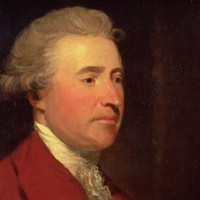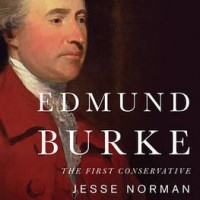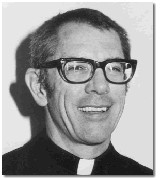Edmund Burke: the greatest Whig, the first conservative , by Daniel Hannan
I still remember the shock I felt when I was about half way through Burke’s Reflections on the Revolution in France. I was spending an undergraduate summer meandering slowly from Chicago to New Orleans when, in the middle of a passage about something else, I came across a glancing reference to France’s “captive king”. Stunned, I put the paperback down and stared round-eyed at my fellow Greyhound passengers.
Until that moment, it had not properly hit me that the entire book, the most penetrating denunciation of revolutionary excess ever composed, had been written before the Terror started. As a piece of political prophecy, it stands unsurpassed.
Burke predicted the chaos, the repression, the arbitrary confiscations , the executions and even, with uncanny foresight, the Bonapartist dénouement:
In the weakness of one kind of authority, and in the fluctuation of all, the officers of an army will remain for some time mutinous and full of faction, until some popular general, who understands the art of conciliating the soldiery, and who possesses the true spirit of command, shall draw the eyes of all men upon himself. Armies will obey him on his personal account. The moment in which that event shall happen, the person who commands the army is master of your whole republic.
There are never any prizes in politics for being right too early. Burke stood apart, an ascetic soothsayer, a lonely vate, descrying a future invisible to his contemporaries. He was right about America, right about Ireland, right about India and, outstandingly, right about France. As is usually the way, his peers never properly forgave him.
We may honour Burke as the first and greatest of those politicians who put ideas before preferment: the patron saint of all the Enoch Powells, so to speak. For three decades, Burke was the most gifted and eloquent MP in the Commons; yet he spent less than two years in government – resigning his junior ministerial post, typically, on a point of fairly minor principle.
We might venerate him, too, as one of the finest orators and pamphleteers of any age. If you think it odd that, as a teenager, I was reading Burke for pleasure on a Greyhound bus, I can only assume that you haven’t come across his prose. He is one of that tiny number of writers, along with Macaulay and Orwell, whose style pulls you along pretty well regardless of what they are talking about.
All this, though, is to miss the real significance of Burke. He was the first modern conservative thinker, and one of the most penetrating and complete political philosophers to have written in English. It is this aspect of the great Irishman that captivates Jesse Norman, his brilliant biographer – and incidentally, the Conservative MP for Hereford.
Read the complete article in The Telegraph
Burke, Party, and the Human Person, by J.P. O’Malley
The philosopher and statesman Edmund Burke is often lauded as the founder of modern conservatism. Burke was born in Dublin in 1729 and educated at Trinity College. In 1750 he moved to London, where he stayed for the remainder of his life.
When he arrived in London, Burke had a very brief career in law, but he soon dedicated his life full-time to critical thinking, writing, and politics. Over his long and distinguished career Burke published a number of groundbreaking books, including A Philosophical Enquiry into the Origin of Our Ideas of the Sublime and Beautiful and Reflections on the Revolution in France.
Burke lived during an extraordinary period in British history, where his good friends included Samuel Johnson, Adam Smith, and David Hume.
In his new book, Edmund Burke: The First Conservative, Jesse Norman dissects Burke’s outstanding intellect and his career. He then asks how Burke’s ideas might be applied to modern politics.
Jesse Norman is a Conservative MP for Hereford and South Herefordshire in the UK. He is a senior fellow at the UK think tank Policy Exchange and has taught philosophy at University College London and Birkbeck College.
In the book you discuss how Burke believed the only way to destroy what he insisted was the “King’s network of patronage” was through political parties. Can we see this as the precursor for the modern political party?
Well, the idea of a political party for Burke is contrasted with the idea of a faction, which is a group of people who come together to achieve a goal. They have no further glue that keeps them together after this goal and therefore they tend to disperse. In opposition to that idea is a party, in which a group of people are united around a principle that cannot be exhausted. Therefore they do not disperse after some particular achievement. They maintain themselves.
What is so fascinating about Burke’s conception of a political party is that he then builds into this a wider notion of what you might call a para-constitutional role. This is where political parties serve a number of functions: they act to debate, to create an oppositional government, to train and recruit political talent, and to make political principles more effective and create an open government.
So I think when people denounce political parties now within our current political system, they are often unaware of the alternatives. And the alternatives are a system of factions, which you see in the eighteenth century, before the idea of party politics really took over. If it’s not a politics of faction, then you get a politics of special interests: this is what you see in America presently, where very lightly whipped parties are dominated by a money interest.
You describe Burke as one the earliest postmodern political thinkers. You also refer to him as one of the greatest critics of the modern age and of liberal individualism. Can you briefly talk about this?
Well Burke is not a postmodernist in the sense that he does believe that there is truth and falsehood. He doesn’t believe that everything is a matter of narrative or power relations. But he is a postmodern: that is to say his thought contains within it a critique of modernity. And that critique begins with an understanding of human nature. Because where modernity goes wrong—from a Burkean perspective—is in the application of human nature to our reasoning of human affairs.
That is something that you find within liberal individualism: this idea of treating a human being as a mere economic agent. This gives rise to cultural feedback that then bends the nature of humans, because they react to how they are understood. So you have this perception that people are simply motivated by greed and fear. That greed-and-fear psychology then gets embedded in a culture.
But what Burke says is that humans are not mere economic agents; what really matters is how they link with each other. We cannot see people only in terms of incentives, but in terms of habits and affections as well.
When you do that, you get a rich conception of the social order. It’s an idea where people are not just driven by greed.
You get a much better idea and understanding of how people actually behave. You also avoid these effects where people are encouraged to be greedy, and therefore they become greedy as a result.
Read the complete interview in The University Bookman
On the Reading of Books, by Rev. James V. Schall, S.J
On Thursday, May 1, 1783, with “the young Mr. (Edmund) Burke” present, Samuel Johnson remarked: “It is strange that there should be so little reading in the world and so much writing. People in general do not willingly read if they can have anything else to amuse them.” The word “reading” here does not mean, say, the reading of e-mails, which are read immediately on reception. Rather, “reading” here means setting aside time and giving attention. Reading is an actively passive occupation. I never read without a pencil, except perhaps when reading my breviary (but this is only because, if I had a pencil over lo these many years, the whole four volumes would be underlined).
The subject of the pleasure of books was recently brought to my attention by the unexpected gift of a used book, Christopher Morley’s 1919 classic The Haunted Bookshop, a book I had never heard of before. Mr. Mifflin, the proprietor of the Haunted Bookshop, when asked by a young man whether a used book shop is not “delightfully tranquil,” replied, “Far from it. Living in a bookshop is a little like living in a warehouse of explosives. Those shelves are ranked with the most furious combustibles in the world — the brains of men.”
So it was sobering to read Johnson, who added: “No man reads a book of science from pure inclination. The books that we do read with pleasure are light compositions, which contain a quick succession of events.” Johnson then went on to admit, however, that he had recently read the complete works of Virgil with great pleasure.
So the question of reading must include, “The reading of what?” And I suppose a distinction can be found between reading for pleasure and the pleasure of reading. I can well imagine reading a scientific book with pleasure, coming across the explanation of something that had long puzzled us, now spelled out in coherent and clear form.
Read the complete article in The Imaginative Conservative
Edmund Burke on Manners, by Ian Crowe
It took Edmund Burke a very little time to decide that French Revolutionary philosophy posed a massive threat to civilization and social stability throughout Europe. By the end of his life, eight years after the storming of the Bastille, his fears of Jacobin contagion had led him to ask for a secret grave, removed from his family sepulchre and hidden from those-the English Jacobins-who would plunder the lead from tombs for bullets to assassinate the living. In 1796 he wrote: “…out of the tomb of the murdered monarchy in France has arisen a vast, tremendous, unformed spectre, in a far more terrific guise than any which ever yet have overpowered the imagination, and subdued the fortitude of man.” He demanded nothing short of a war of extermination against this “armed doctrine.”
It is somewhat surprising, then, to find that this enormous threat brought out Burke’s most urgent defense of an aspect of civilization as trivial as “manners.” Of course, the very fact that we consider manners “trivial” was all part of the problem from the start, as far as Burke was concerned, and he felt driven to state his case unambiguously in his First Letter on a Regicide Peace (1796):“Manners are of more importance than laws. Upon them, in a great measure, the laws depend.” How can this apparent inversion of common sense be justified?
Manners are clearly not the same as laws. They are generally unwritten (unless we are talking about ritual), and they lack the regular, codified sanctions that support institutes and decrees. However, they have a similar function: in our small social communities and informal relationships they lay down expectations of behavior that facilitate the smooth-running and therefore expedite the purpose of these various bodies from the nuclear family to the shopping mall. These very circumstances which make sense of our manners mean that they cannot be constituted and implemented like laws and they should not; but we commit a serious mistake if we allow the institutionalized power of the latter to diminish our respect for the former. It is the very superficial weakness of manners that actually constitutes their crucial importance in our lives.
There are two further points of definition to note here. First, Burke points out, manners are always with us and, in their nature, they are quickly adaptable to changing circumstances in a way that written laws can never be, however firm or enthusiastic the backing for those laws might be. The very strength of manners lies in the fact that they are unwritten: they work “by a constant, steady, uniform, insensible operation, like that of the air we breathe in.” Secondly, and consequentially, they are in all respects prior to laws in our consciousness and understanding. They precede the rational in their operation: they inform and prepare us: before there is any possibility of consent or contract to “legitimise” our relationships, they instruct us in and incline us towards our duties and responsibilities. We can see that they are nurtured by, and that they themselves reinforce, those very associations to which we are committed by circumstances that exist before and above any voluntary contract of mutual self-interest. The “origin of all relations, and consequently the first element of all duties” is marriage, and the family, of course, the first of all such associations.
Burke wishes us to understand that pre-contractual associations are not primitive forms of living to be superseded by an enlightened, social man when the time comes. They are the schools of behavior and values without which man will never become properly enlightened, and in the absence of which more “advanced” contractual agreements will flounder. They are supremely more important sources of education than the most liberal courses in citizenship, and it is manners that teach us their value and authority. They have a further, most important function, too. Manners preserve the vibrancy of local associations by drawing us-almost instinctively- into the uncalculated exercise of responsibilities, by engendering a respect for our surroundings and our neighbors, and by giving us all some practical, local experience in the trusteeship of authority. In so doing, manners inform us of the proper scope of the powers to be granted to the state, and protect our inherited liberties and our possessions from the largely well-meaning but increasingly insistent encroachments of central government.
They can achieve this vital purpose only because they derive their shape from the moral values that underpin society, and that are rooted in our as social beings. “According to their quality,” Burke argues, “they aid morals, they supply them, or they totally destroy them.” These values have been imposed from above, by government education or propaganda, and essential that manners are left free reveal them in the wisdom of succeeding generations, in the form of customs, traditions, religious tenets, and the of ordinary people as they go about their common and daily business. They must not become subject to manipulation by the state, nor must they be confounded with laws, because if this happens they will become unable to fulfill that purpose of restraining the potential abuse of power by our governors. Manners are the prerogative of our own pre-contractual associations, the family and the community, which the state should serve, and which should guard jealously as guarantees our diversity and independence.
Read the complete article in The Imaginative Conservative
Mr. Kirk, please meet Mr. Burke: 1950
In the fall of 1950, Russell Kirk turned the ripe old age of 32. He had been publishing articles and reviews (and soon his M.A. thesis on John Randolph of Roanoke through the University of Chicago) since 1936. Even during college, academic journals had accepted his undergraduate work, assuming him to be a tenure-track professor.
Throughout his earliest publications, Kirk full explored the ideas of tradition and liberty, attempting to balance the sometimes tension-filled influences of Irving Babbitt, Paul Elmer More, Albert Jay Nock, and Isabel Patterson. Indeed, he immersed himself in any and every work imaginable, but he kept returning to these four.
When Kirk had written his M.A. thesis on John Randolph a decade earlier at Duke, he had encountered Burke as an intellectual inspiration. Almost certainly, Kirk had encountered Burke even earlier through his beloved New Humanist undergraduate literature professor, John Abbott Clark. From his first encounter with the Anglo-Irish statesman, Kirk probably had liked Burke. Certainly, there’s no evidence to indicate the opposite. While an undergraduate at Michigan State, he also encountered the works of T.S. Eliot, but he’d dismissed his Anglo-American contemporary as a “fraud.”
Read the complete article in The Imaginative Conservative



